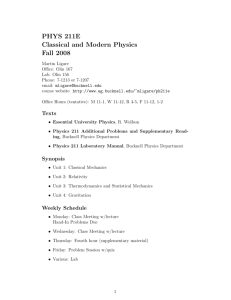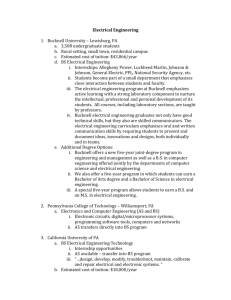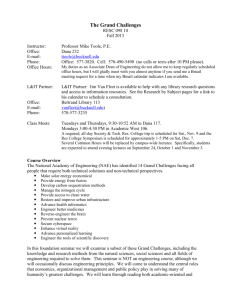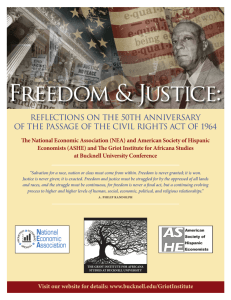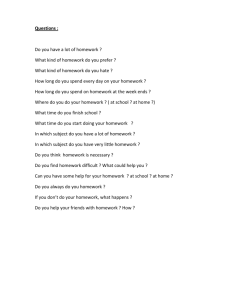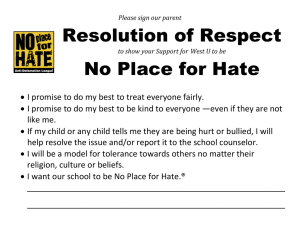Interreligious Baccalaureate Service Class of 2007 Weis Center Bucknell University
advertisement
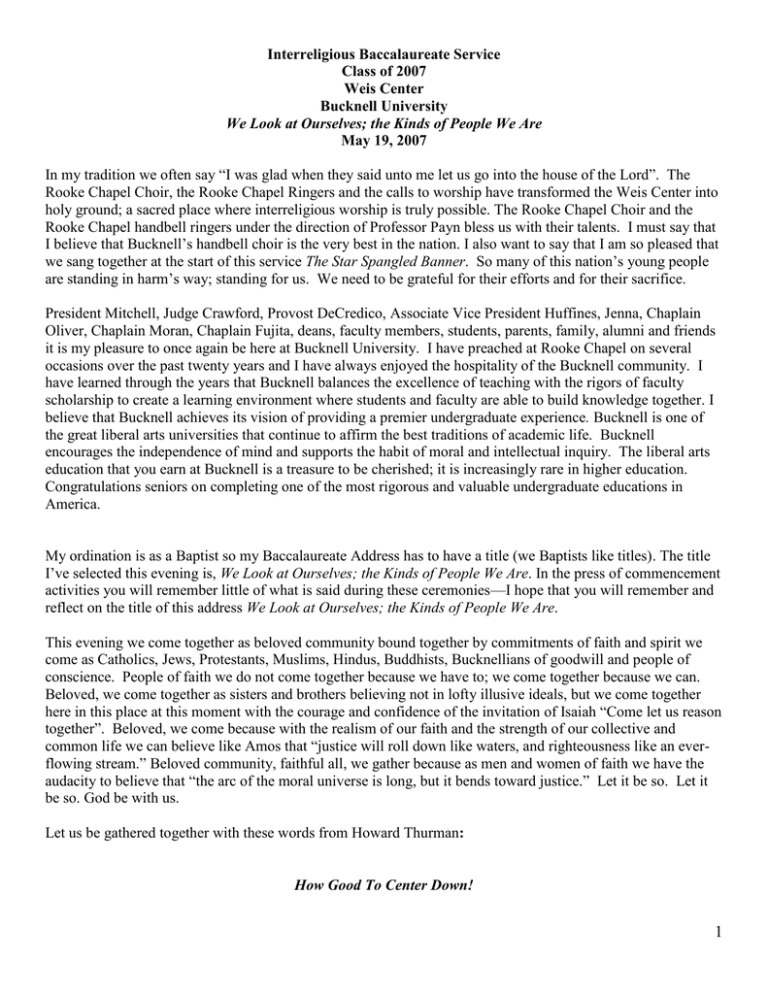
Interreligious Baccalaureate Service Class of 2007 Weis Center Bucknell University We Look at Ourselves; the Kinds of People We Are May 19, 2007 In my tradition we often say “I was glad when they said unto me let us go into the house of the Lord”. The Rooke Chapel Choir, the Rooke Chapel Ringers and the calls to worship have transformed the Weis Center into holy ground; a sacred place where interreligious worship is truly possible. The Rooke Chapel Choir and the Rooke Chapel handbell ringers under the direction of Professor Payn bless us with their talents. I must say that I believe that Bucknell’s handbell choir is the very best in the nation. I also want to say that I am so pleased that we sang together at the start of this service The Star Spangled Banner. So many of this nation’s young people are standing in harm’s way; standing for us. We need to be grateful for their efforts and for their sacrifice. President Mitchell, Judge Crawford, Provost DeCredico, Associate Vice President Huffines, Jenna, Chaplain Oliver, Chaplain Moran, Chaplain Fujita, deans, faculty members, students, parents, family, alumni and friends it is my pleasure to once again be here at Bucknell University. I have preached at Rooke Chapel on several occasions over the past twenty years and I have always enjoyed the hospitality of the Bucknell community. I have learned through the years that Bucknell balances the excellence of teaching with the rigors of faculty scholarship to create a learning environment where students and faculty are able to build knowledge together. I believe that Bucknell achieves its vision of providing a premier undergraduate experience. Bucknell is one of the great liberal arts universities that continue to affirm the best traditions of academic life. Bucknell encourages the independence of mind and supports the habit of moral and intellectual inquiry. The liberal arts education that you earn at Bucknell is a treasure to be cherished; it is increasingly rare in higher education. Congratulations seniors on completing one of the most rigorous and valuable undergraduate educations in America. My ordination is as a Baptist so my Baccalaureate Address has to have a title (we Baptists like titles). The title I’ve selected this evening is, We Look at Ourselves; the Kinds of People We Are. In the press of commencement activities you will remember little of what is said during these ceremonies—I hope that you will remember and reflect on the title of this address We Look at Ourselves; the Kinds of People We Are. This evening we come together as beloved community bound together by commitments of faith and spirit we come as Catholics, Jews, Protestants, Muslims, Hindus, Buddhists, Bucknellians of goodwill and people of conscience. People of faith we do not come together because we have to; we come together because we can. Beloved, we come together as sisters and brothers believing not in lofty illusive ideals, but we come together here in this place at this moment with the courage and confidence of the invitation of Isaiah “Come let us reason together”. Beloved, we come because with the realism of our faith and the strength of our collective and common life we can believe like Amos that “justice will roll down like waters, and righteousness like an everflowing stream.” Beloved community, faithful all, we gather because as men and women of faith we have the audacity to believe that “the arc of the moral universe is long, but it bends toward justice.” Let it be so. Let it be so. God be with us. Let us be gathered together with these words from Howard Thurman: How Good To Center Down! 1 How good it is to center down! To sit quietly and see one’s self pass by! The streets of our minds seethe with endless traffic; Our spirits resound with clashings, with noisy silences, While something deep within hungers and thirsts for the still moment and the resting lull. With full intensity we seek, ere the quiet passes, a fresh sense of order in our living; a direction, a strong sure purpose that will structure our confusion and bring meaning to our chaos. We look at ourselves in this waiting moment—the kinds of people we are. The questions persist: what are we doing with our lives? What are the motives that order our days? What is the end of our doings? Where are we trying to go? Where do we put the emphasis and where are our values focused? For what end do we make sacrifices? Where is my treasure and what do I love most in life? What do I hate most in life and to what am I true? Over and over, the questions beat in upon the waiting moment. As we listen, floating up through all the jangling echoes of our turbulence, there is a sound of another kind—a deeper note which only the stillness of the heart makes clear. It moves directly to the core of our being. Our questions are answered. Our spirits refreshed, and we move back into the traffic of our daily round. With the peace of the Eternal in our step. How good it is to center down! (pp, 93-94) Seniors, about ten years before most of you were born I arrived as a first year college student in Providence at Brown University. We came by van, my whole immediate family. My father, my mother, my four brothers and my sister—the whole family came to move me into my dorm—Perkins Hall at Brown University—that was September, 1975. The first person we saw as we started down the hall was Wes, a tall lean Texan, an extremely skinny man. Wes was on his way to the shower encircled by what looked to be a hand towel! There were and are no words to describe the look on my father’s face when he turned to me and said “Is this the girl’s dorm?” I said meekly and defiantly, “Daddy, you signed the paper so I could be in a coed dorm.” He knew that I knew that he had signed the paper, but could not read it. He said no more about it—we found my room. There had been no thought given to my visiting colleges before I applied. Neither of my parents had gone to college, or even high school. My father finished the fifth grade, my mother the third. They were hardworking people, who emphasized education, knowing that it was the best way for their six children to have opportunities that had been beyond their reach. My mother had taught me to read. By the time I was three years old, I knew all the words that she knew how to spell or recognize. My parents bought two sets of Encyclopedia Britannica, both the junior and the regular volumes; my mother told me to start reading them. She also got a neighbor girl to take me to the public library to get a library card. The requirement for a public library card was you had to be able to write your name; there was no age requirement. I was very short then—now I am 4’11 and ¾. I was lifted onto the librarian’s counter and handed a pencil. My fine motor skills have never been terrific; it took awhile but the librarian was patient as I wrote my name carefully in all capital letters; only my “N” was backwards. The librarian gave me the card anyway. With my card in her hand my mother took me back to the library every week. She bought me a little shopping bag from the library and week after week we walked to the library to get a bag of books; always non-fiction. She said “I do not want you reading no lies.” Fiction in her opinion was nothing but lies. She pushed me to learn by heart the Gettysburg Address, the Preamble to the 2 Constitution and the Bill of Rights. My recitation of these documents to my mother as she ironed the family’s clothes was my first and formative experience as a public speaker. “Say it slow and clear child, so people can get the meaning of what you’re saying.” So I came to Brown sight unseen without the benefit of Google; I relied only on the advice of my guidance counselor, Barron’s Guide to Colleges and the catalogues and pictures that I had been sent from the university. I knew no one at Brown, no one in Providence but was so very happy to finally be on my own and in college. That first day was defined by anxious greetings; almost every person that I met that first day had gone to private schools. My next door neighbor in the dorm, Arianna, laughed deeply when I told her the name of my high school. “Freeport High School…isn’t that cute,” she said, “a school the same name as the town.” Arianna had gone to Miss Porter’s School for Girls. The first week was rough; so many obvious and simple things were unexpected and different. That week I called the dining hall menu line and found out that on Thursday, baked potatoes were for dinner. Great! Not quahogs, not kielbasa, not shepherd’s pie. Good ole baked potatoes. Great! Finally something was going to be my familiar; my family ate baked potatoes every Sunday when we returned home from church. On Thursday, I went alone to dinner; I went early—and yes again I was shocked! When I looked at the steam trays in the dining hall, the potatoes were white. I had never in my life imagined or seen baked white potatoes. My stomach tied itself into a knot! I didn’t cry but tears brimmed my eyes. I thought that I would never fit in. By definition baked potatoes were sweet potatoes. White potatoes were cut up into French fries, boiled for potato salad or made into mashed potatoes. Baked potatoes called white potatoes—who would have known. Seniors, I invite you to consider your own first week’s surprises. My college years were a long time ago—you are a different generation; perhaps two generations removed from my first-year college experience. I see you are pioneers living in the most fast past technological times in human history. Play stations, computers, Google, cell phones, iPods, YouTube, Facebook, CNN—your world is a long way from the white potatoes versus sweet potatoes challenge of my first college week. Vietnam, the draft, the Soviet Union, the Cold War, Woodstock, Kent State, hashish brownies, lynching, civil rights, black power, freedom riders, the Voting Rights Act, Roe vs. Wade, Title IX, rock and roll, disco, and feminism are not your shibboleth. You have coined your own terms and spoken your own watchwords. Your zeitgeist is informed by your experiences, the spirit urgencies of your times. You may think of 9/11, terrorism, rights for gays and lesbians, alcohol binging, Meth and Ecstasy, HIV-related illnesses, safe sex, community service, globalization, hanging “chads”, green choices, economic development in China, the Iraq War, hip hop, intelligent design, American Idol. Your experiences as undergraduates and your prayers will long be defined by Virginia Tech; God be with that community of our concern. You know more than the generation of your parents do about international affairs, domestic matters, multicultural differences, governmental responsibility, teamwork, global markets and the planet earth; you know more, you know more about your own dreams. We Look at Ourselves; The Kinds of People We Are. Let us consider the questions that Thurman has put before us. What are we doing with our lives? What are the motives that order our days? What is the end of our doings? Where are we trying to go? Where do we put the emphasis and where are our values focused? For what end do we make sacrifices? Where is my treasure and what do I love most in life? What do I hate most in life and to what am I true? (Thurman, 94) What kinds of people are we? In a word, if you are within the sound of my voice you are blessed. You are blessed. You are blessed because you have more than most people in the world will ever hope to have. Your parents cherish you and you trust them. You are smart, you are safe, you are free to think, you expect justice, 3 you assume opportunities, you count on civility, you offer respect, you have hope, your reach may exceed your grasp. Your Bucknell University education promises you access to a global neighborhood, a network of new friends, careers, vocations, privileges and responsibilities in communities that will count on your leadership and depend on your skills. Allow your reach to exceed your grasp. What are we doing with our lives? Having never left the academic world, I resent hearing the oft-repeated statement, “College is not the real world”. Your life as students has been very, very real. You have learned new ways of thinking here at Bucknell. You have met people at Bucknell who have changed some of your most basic assumptions and challenged some of your default understandings. Your real world has included meeting new friends from across the nation and around the world, reading the great thinkers of this and past centuries, participating in cutting edge research in engineering, chemistry, robotics, environmental science genetics, and psychology. You have explored new personal boundaries and measures of your independence and character. You have learned to make wise choices, deeply intimate choices, ethical and faith-based decisions. For the past four years, your adult life has been up against the national backdrop of fast disappearing affordable housing, rising health care costs, shrinking employee benefit plans, fears about terrorism, acknowledgement of global poverty, an aging domestic infrastructure, a failing Social Security system, global warming, and wars and rumors of wars. In your real world you have had the opportunity at Bucknell to learn a lot about yourself, and about your responsibilities as informed and educated citizens and leaders in this and larger communities. What are the motives that order our days? How and when are you like the prophet Jeremiah; what is the fire that is shut up in your bones? What are your passions? What informs and moves your spirit? What are your motives? Why do you do what you do? What makes you, who you are? What are your core values? What is at the center in you? Beyond Bucknell’s gate; outside of the safety zone of the Bucknell bubble, do find time and places to understand and to prioritize what your inner urgings are. Don’t bury yourself in the demands of work. Don’t hide in “busy-ness”. Don’t hide behind the familiar. Don’t become complacent in the rhythms of an entry level job. Do not cloak yourself in rules. Dare to venture forward to new challenges. Be brave. What is the end of our doings? In the context of communities of concern what will be your future, what are your goals—short term goals, strategic goals, faith goals. What are you trying to accomplish? What are your expectations for your life? How will you know when it is time to change the plan, how will you recognize when you have achieved a goal, when will you know it is time to set new goals, to recognize and address a stultifying situation, a dangerous or toxic relationship or to walk away from a dead dream? Cherish your imagination seniors; don’t be afraid of dreaming new dreams. Take the risk of dreaming big dreams. Where are we trying to go? Understanding your values will help you experience your life’s journey. You have come this far by hard work, a measure of good luck and with faith for your future; reach for your dreams; protect your hopes; refresh and renew your spirit; be courageous. What do I hate most in life and to what am I true? Perhaps the hardest question put before us today by Thurman’s words, “What do I hate most in life”? Hate is a hard word to use. We have learned to be tolerant. We have learned to value diversity. We have rightly learned to respect difference. We have learned understanding. It is hard to judge. It is hard to draw the line and say this is just not right; this is beyond the pale. This is off the hook. It is hard to plant your tent and say “As for me and my house…” Hate is hard but it is a reality in when considering closely held values, core beliefs and fundamental religious traditions. Seniors, protect your heart when you consider hate. Consider your spirit when you talk about hate; even when you think about hate. Understand what you love before you name what you hate. Hate may be for some of us a necessary boundary; it helps us say “I am not going there.” Hate—we put it behind us; we shake it from our feet. Know what you hate. Love what you love. Respect mercy, seek justice, and embrace grace. In the face of hate seek mercy and healing for your own spirit, your heart, your soul. 4 To what am I true? We saw in Hurricane Katrina the chaos of the abyss; American born citizens called refugees is a terrorism of failing and bloated bureaucracies. The war in Iraq has eroded confidence in our ability to care for our wounded soldiers. So many of your peers have made the ultimate sacrifice yet not enjoyed the thanks of a grateful nation. We ought to be grateful for all who have died and been injured in the wars of this nation. Young women and men, who have served in the military, do serve in the military and will serve in the military deserve our thanks. Please remember them in your prayers. Structural social issues like urban and rural poverty remain like a dull knife slicing the American economic pie. Obesity is killing and Americans who have low incomes and little access to nutritious food, health information and preventive health care. Our true commitment to social justice, civil rights, fair opportunity, equitable access is at stake; to what are we true? To what are we true?! We must face the divide in this country defined by class and race. The cut and thrust of our national discourse requires us to face the good and troubling truths of our common life. We look at ourselves: the kinds of people we are. Seniors, your Bucknell University degree will identify you around the globe as among the best educated men and women in the world. Your education is a sacred trust—it affords you privilege and it requires of you responsibility. Your Bucknell University degree is an opportunity for leadership; it is your opportunity for responsibility. As Bucknell alum you will never be able to sit on the sideline and be just a face in the crowd. You have been equipped by your Bucknell education to face global issues and personal questions. There is a lot to be done. As people of faith, as responsible citizens, there is a world at stake. Beloved seniors, you are called, called forth as citizens, as leaders, as neighbors and friends. You will not be able to take refuge in the silence of the majority; you must speak up for the poor in spirit. You must reach out for those who mourn. You must stand up for those who are persecuted. You must be a steward of mercy. You must work for justice. You are called to be a voice of reason. You must not be meek. We are counting on your leadership. We are counting on your courage. We are counting on you. Finally, center down. Take time to center down. Take time to be still. In stillness you will find truth and strength, choice and challenge, redemption and imagination. In stillness you will renew your faith, your values, your hope and your courage. Enjoy your now. Do not look so far away from today that you miss what’s near and dear. Enjoy the dawn of day, the brightest of noon, the cool of sunset, the company of friends. Go outside and play. Congratulations on your graduation and lifelong membership in the family of Bucknell University. God be with us. God be with each of us. God bless each of you. Amen. Jewelnel Davis University Chaplain Associate Provost Director of the Earl Hall Center Columbia University in the City of New York 5 Work Cited Thurman, Howard. For The Inward Journey: The Writings of Howard Thurman. Richmond, Indiana: Friends United Press, 1997. 6
